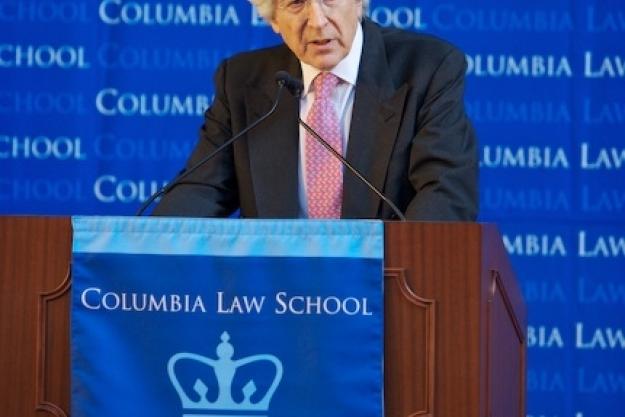
The tenth anniversary of the entry into force of the Chemical Weapons Convention (CWC) and the Organisation for the Prohibition of Chemical Weapons’ (OPCW) decade-long implementation of the treaty was commemorated in New York on 8 October 2007 at a symposium organised by Columbia Law School and the United States Permanent Representative to the OPCW, H.E. Ambassador Eric M. Javits. The symposium highlighted the OPCW as an example of effective multilateralism, reviewed the CWC’s first decade and looked toward its future as it remains vital to international security, disarmament, non-proliferation and global economic development.
In his keynote address, the OPCW Director-General, Ambassador Rogelio Pfirter expressed his deep gratitude to H. E. Ambassador Javits for his personal commitment in organising this event. Director-General Pfirter stated in his address that while the international community can draw considerable satisfaction from the OPCW’s performance over the first ten years of its existence, it is essential that a course for the OPCW’s future be charted that responds to emerging demands. Director-General Pfirter thanked the United States and all of the OPCW Member States that organised events to mark the OPCW’s tenth anniversary, confirming the importance that the international community continues to attach to the realisation of a world that is forever free from the threat of chemical weapons. Referring to the CWC as an outstanding achievement in disarmament, he underscored the OPCW’s role in the treaty’s implementation as a worthy example of multilateralism at work in the service of humankind.
The symposium was structured into two panels, moderated by two eminent professors at Columbia Law School: Lori Fisler Damrosch, Henry L Moses Professor of International Law and Organisation, and Richard N. Gardner, Professor of Law and International Organisation. Panellists comprised: Ambassador Eric M. Javits, United States Permanent Representative to the OPCW; Ambassador Rolf Ekeus, Chairman of the Governing Board of the Stockholm International Peace Research Institute and OSCE High Commissioner on National Minorities; H.E. Ms Xue Hanqin, Ambassador of the People’s Republic of China to the Netherlands and Permanent Representative to the OPCW; Ambassador Donald A. Mahley, Deputy Assistant Secretary for Arms Control Implementation with the Bureau for International Security and Non-proliferation of the U.S. Department of State; U.S. Representative Christopher Shays, Member of the Homeland Security Committee’s Subcommittee on Intelligence, Information Sharing and Terrorism Risk Assessment; the Honorable Annalisa Giannella, EU High Representative Javier Solana’s Personal Representative on Non-proliferation of Weapons of Mass Destruction; and Matthew S. Borman, Deputy Assistant Secretary of Commerce for Export Administration.
During the symposium discussions, the panellists took stock of the successes achieved and the challenges encountered in the CWC’s implementation, and considered the lessons learned, expectations, and limitations of the multilateral treaty systems in disarmament and non-proliferation of weapons of mass destruction.
PR106/2007
